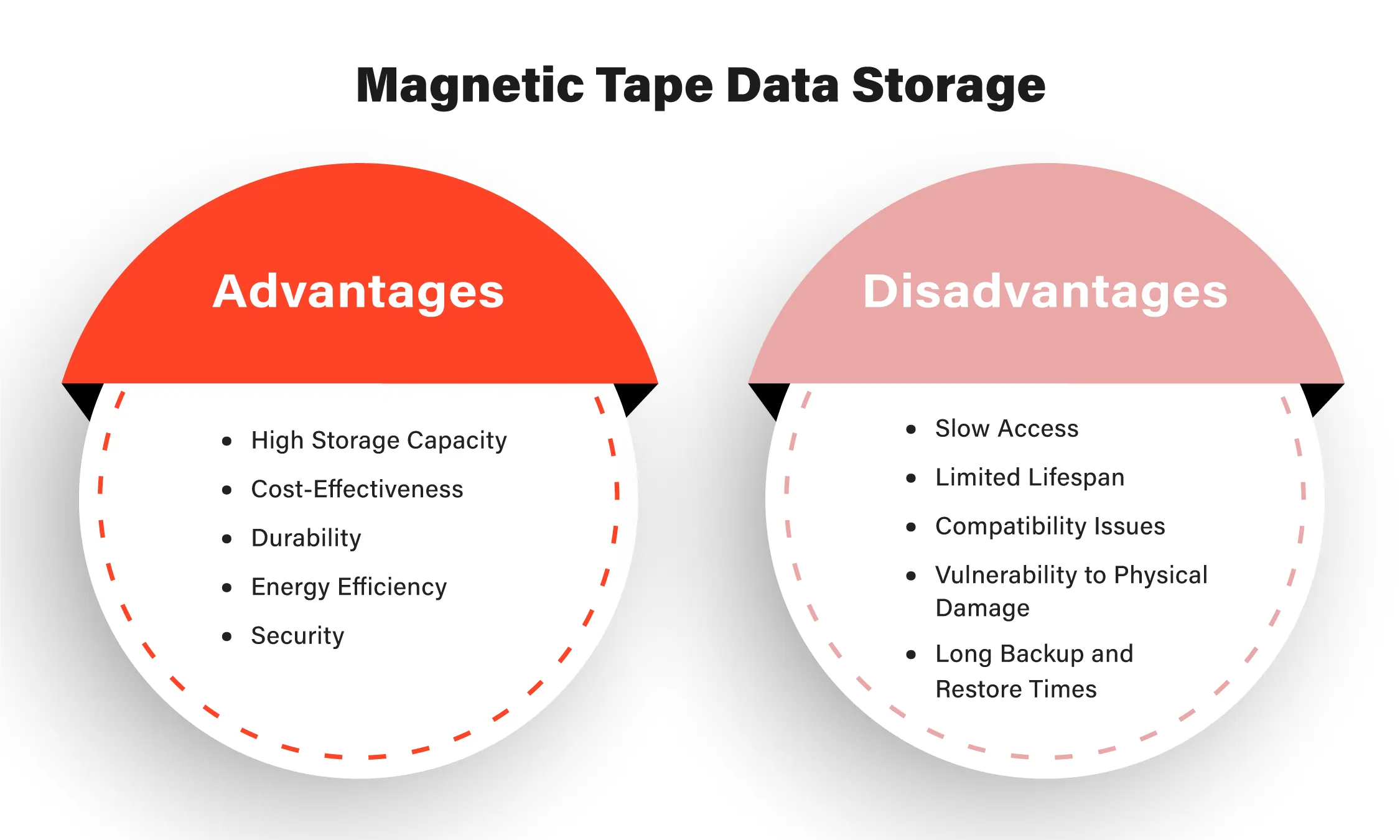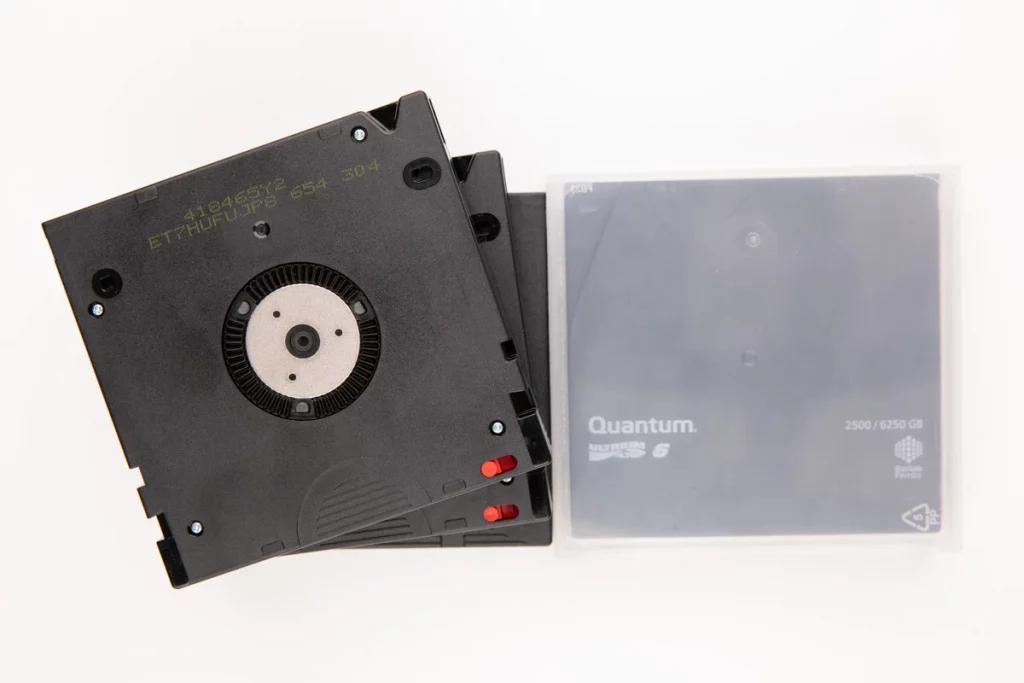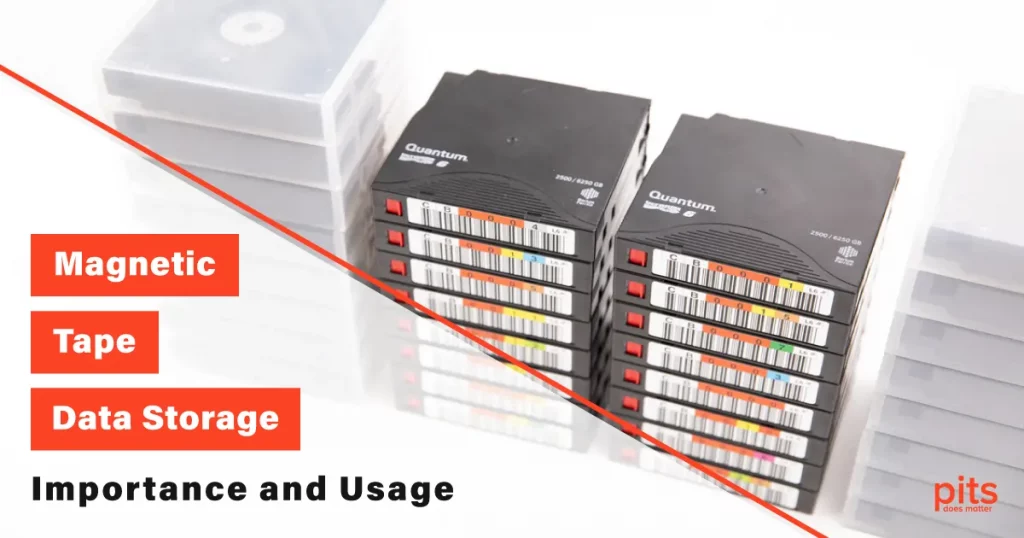In today’s era of digital data storage, magnetic tapes seem like an outdated technology. However, they are still widely used in various industries and have several advantages over other storage options. In this blog, our team will discuss what magnetic tape storage is, where tape data storage is used, and the benefits and drawbacks of magnetic recording tapes.
What is Magnetic Tape Storage?
Tape storage is a type of data storage technology that uses magnetic tape to store and access digital information. It is a sequential access storage medium, meaning data is read or written linearly from one end of the tape to the other.
The tape consists of a thin, plastic strip coated with a magnetic material, typically iron oxide. Data is stored on the tape in the form of magnetic fields created by aligning the particles of the magnetic material in a specific pattern. These fields can be read and written by a magnetic tape drive, which uses a magnetic read/write head to detect and alter the magnetic fields on the tape.

Where is Magnetic Tape Data Storage Used?
Magnetic tape data storage is still used in several industries, primarily for archival and backup purposes. Here are a few examples of where tape media is used:
Entertainment Industry
The entertainment industry uses magnetic tapes to store large amounts of data, including movies, music, and television shows. Magnetic tapes are a cost-effective solution for storing large files that may not be accessed frequently but must be preserved for future use.
Healthcare Industry
The healthcare industry uses magnetic tapes to store patient records and medical images such as X-rays and MRI scans. These records need to be stored for long periods and retrieved when required. Hence, tape backup is often used for these purposes.
Government Agencies
Government agencies use magnetic tape libraries to store sensitive information, such as classified documents, defense records, and surveillance data. Magnetic tapes are a secure storage option that can be stored to protect the recorded data from unauthorized access.
Advantages of Magnetic Tapes
- High Capacity. Magnetic tapes can store large amounts of data, with some tapes having a capacity of up to 185 TB. This makes them an ideal choice for storing large files, especially in industries such as media and entertainment.
- Cost-effective. Tapes are a cost-effective storage solution, especially when compared to other options. This makes them a popular choice for businesses that have to store large amounts of data but have a limited budget.

- Durable. Magnetic tapes are a durable storage option, and they can last several years if stored and handled properly. This makes them a reliable choice for archival and backup purposes, where data needs to be preserved for long periods.
- Security. Tapes are a safe storage option, as they can be stored in secure locations and are not vulnerable to hacking or cyber-attacks. This makes them ideal for storing sensitive data such as medical records, financial data, and government documents.
Disadvantages of Magnetic Tapes
- Slow Access. Tapes are a sequential access storage medium, meaning that data is read or written linearly from one end of the tape media to the other. This makes access times slower than other storage options which provide high speed, such as hard disk drives (HDDs) or solid-state drives (SSDs).
- Fragility. Tape technologies are fragile storage mediums that can be damaged if mishandled or exposed to extreme temperatures or humidity. This can result in corruption, making it important to handle tapes carefully and store them in appropriate conditions.
- Limited Lifespan. Tape cartridges have a limited lifespan, and the magnetic material can deteriorate over time. This can result in data loss, making it important to check and maintain the tapes regularly.
- Compatibility Issues. Magnetic tapes may not be compatible with all hardware and software systems. This can make transferring data between different systems difficult, especially if the hardware or software is outdated.
Causes of Data Loss on Tapes Magnetic
Magnetic tape storage is a reliable and cost-effective medium used for decades for backup and archival purposes. However, like all storage mediums, magnetic tapes are also susceptible to data loss due to various factors.
Physical Damage
Physical damage is one of the most common causes of data loss on magnetic tapes. Tapes are fragile and can be easily damaged if not handled with care. Any kind of physical damage, such as bending, crushing, or tearing, can cause the tape to lose data. The read/write head can also cause physical malfunction if it comes into contact with the tape during the operation.
Magnetic Fields
Magnetic fields can also cause data loss on magnetic tapes. Strong magnetic fields can corrupt or erase the data stored on the tape. The magnetic material on the storage is sensitive to magnetic fields, and exposure to strong fields can cause the data to become unreadable. Magnetic fields can be generated by other electronic devices, such as speakers or motors, and can also be caused by natural phenomena, such as lightning strikes.

Temperature and Humidity
Temperature and humidity can play a role in data loss on magnetic tapes. High temperatures can cause the magnetic material on the tape to deteriorate, making it difficult to read the data stored on it.
High humidity can cause the device to absorb moisture, damaging the magnetic material and making it unreadable. Storing magnetic tapes in a cool, dry place is important to prevent damage from temperature and humidity.
Age
The magnetic material can deteriorate as magnetic tapes age, causing data loss. This can happen even if the tape is stored in optimal conditions. Over time, the magnetic material can lose its magnetism, making it difficult or impossible to read the data stored on it.
The lifespan of a magnetic tape depends on several factors, including the quality of the tape, the conditions it is stored in, and how often it is used.
Magnetic Tape Drive Data Recovery with PITS Global
We deliver a range of data recovery services for magnetic tapes that have lost data. Our team of experienced data recovery professionals uses advanced tools and techniques to recover lost data from damaged or corrupted magnetic tapes.

If you’re facing a data loss situation, don’t hesitate to contact us. Our 24/7 data recovery services are available to you, 365 days a year. Let us help you recover your precious data today.

We start the recovery process with a risk-free evaluation. Our technicians estimate reasons for data loss and the level of damage. Based on it, we select the most suitable recovery strategy.

With years in the data recovery industry, our company supports the highest customer satisfaction rate. We do everything to provide a positive experience for our clients.

During our remote customer file verification session, you will thoroughly review all necessary documents and records to ensure accuracy and compliance.

We offer data recovery services from over 50 locations across the US. This means that no matter where you are located, you can access our services to recover the data.

With our certified data recovery services and 99% success rate, we are confident that we can recover your precious data and get you back up and running in no time.
We understand your data’s importance to you. That is why we offer a risk-free evaluation for all magnetic tape data recovery services. Our team will evaluate your magnetic tape and provide you with a detailed report outlining the extent of the damage and the estimated time and cost of the recovery process.
We also offer 24/7 emergency data recovery services for magnetic tapes so that you can get your data back as quickly as possible in the event of a data loss emergency.
Our experienced team is devoted to providing the highest quality magnetic tape data recovery services, using the latest tools and techniques to restore your lost data. We have years of experience in recovering data from tapes and can handle even the most complex data loss situations.
If you have a magnetic tape with data loss, do not panic. Contact us at PITS Global Data Recovery Services, and our team of experts will help you recover your lost data quickly and efficiently.
Frequently Asked Questions
What is magnetic tape data storage?
Magnetic tape data storage is a method of storing and archiving digital information on magnetic tapes. It involves using a tape drive to read from and write to a magnetic tape, which consists of a thin strip of magnetic material coated on a plastic film.
Why is magnetic tape data storage important?
- Cost-effective: Magnetic tape offers a cost-effective solution for long-term data storage compared to other storage mediums like hard disk drives or solid-state drives.
- High capacity: Magnetic tapes can store large amounts of data, with capacities ranging from terabytes to petabytes, making them ideal for backup and archival purposes.
- Durability: Magnetic tapes have a long lifespan and can withstand harsh environmental conditions, making them reliable for long-term data preservation.
- Offline storage: Tapes can be easily disconnected from the network, providing an extra layer of security against cyber threats like hacking, viruses, and ransomware.
- Scalability: Tape libraries can accommodate multiple tapes, allowing for easy scalability as data storage needs grow.
What are some common applications of magnetic tape data storage?
- Backup and disaster recovery: Magnetic tapes are commonly used for creating backups of critical data and disaster recovery purposes, providing an offline and reliable method for data restoration.
- Long-term archiving: Organizations with large volumes of data, such as government agencies, research institutions, and media companies, rely on magnetic tape storage for long-term archiving due to its cost-effectiveness and durability.
- Regulatory compliance: Many industries have specific data retention regulations that require organizations to store data for extended periods. Magnetic tape storage meets these compliance requirements efficiently.
- Scientific research: Magnetic tape is used in scientific research for storing massive amounts of data generated from experiments, simulations, and observations, enabling future analysis and collaboration.
- Media and entertainment: Media companies utilize magnetic tape storage for storing large video and audio files, including movies, television shows, and music archives.
How does magnetic tape data storage compare to other storage technologies?
Magnetic tape data storage has its advantages and limitations compared to other storage technologies:
- Capacity: Magnetic tapes offer higher capacity than hard disk drives and solid-state drives, making them suitable for storing massive amounts of data.
- Cost: Magnetic tape storage is more cost-effective than disk-based storage, especially for long-term retention.
- Access speed: Tape drives have slower access speeds compared to disk-based storage, which makes them less suitable for applications requiring frequent data retrieval.
- Data transfer rates: Tape drives have slower data transfer rates compared to modern disk drives, affecting the time required to write or read data.
- Offline nature: Magnetic tape can be disconnected from the network, providing an “air gap” security measure against online threats, unlike disk-based storage systems.
How long does magnetic tape data storage retain data?
Magnetic tape data storage is designed to retain data for extended periods. Under suitable storage conditions, magnetic tapes can preserve data for 20 to 30 years or even longer. However, factors such as environmental conditions, tape quality, and usage patterns can impact the actual longevity of stored data.
